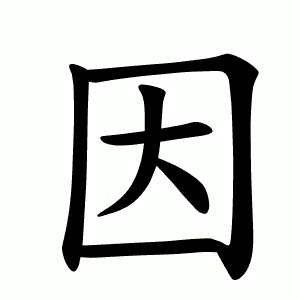因
- reason, cause, basis;
Etymology
Pictographic/compound origin:
囗 (enclosure, boundary) depicts a mat or seat;
大 (great, person) shows a person lying or sitting inside the enclosure.
Originally meant “mat” or “seat.” Later, this meaning was separated into 茵 (mat, cushion) with 艹 added for clarity.
The sense shifted to “depend on,” “be based on,” and then further to “cause, reason.”
Semantic range:
- to be due to, depend on (말미암다, 인하다);
- cause, reason, ground (원인, 까닭);
- by extension, factor or circumstance.
Usage in Korean
원인 (原因) — cause, origin
인과 (因果) — cause and effect (Buddhist/Confucian concept)
인연 (因緣) — karmic connection, fate, affinity
인하다 (因-) — to be caused by, due to
Additional notes
In Buddhist and Confucian thought, 因 is central in the concept of 因果 (cause and effect, karma). Every action (因) inevitably produces a result (果), forming the moral and cosmological framework for justice and responsibility.
In everyday Korean, the verb form “~에 인하다” is a formal expression for “be due to” or “caused by.”
